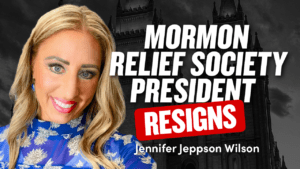 In this episode, Natasha Helfer Parker (The Mormon Therapist) interviews “Sarah,” an LDS mother of four who has a history of depression starting in adolescence followed by a serious bout of postpartum depression after the birth of her second child. She also interviews Jamie Bodily, mother of five and certified doula through to LABOR regarding her experience and knowledge regarding postpartum depression. Jamie has a Masters degree in Mental Health Counseling, a Masters Degree in Human Services from Capella University and her undergraduate degree in Family Science from Brigham Young University. She initiated, co-wrote, and coordinated a doula program for women in recovery from susbtance addiction and runs a website called parentscount.com. Other resources discussed in these interviews include: postpartum.net, doulamatch.net, dona.org, and tolabor.com.
In this episode, Natasha Helfer Parker (The Mormon Therapist) interviews “Sarah,” an LDS mother of four who has a history of depression starting in adolescence followed by a serious bout of postpartum depression after the birth of her second child. She also interviews Jamie Bodily, mother of five and certified doula through to LABOR regarding her experience and knowledge regarding postpartum depression. Jamie has a Masters degree in Mental Health Counseling, a Masters Degree in Human Services from Capella University and her undergraduate degree in Family Science from Brigham Young University. She initiated, co-wrote, and coordinated a doula program for women in recovery from susbtance addiction and runs a website called parentscount.com. Other resources discussed in these interviews include: postpartum.net, doulamatch.net, dona.org, and tolabor.com.
Part1 – Sarah’s history with depression as an adolescent and single adult and then dealing with postpartum depression after the birth of her second child.
Part 2 – Discussion on Sarah’s decision to go on an antidepressant- risks, benefits, guilt factors, stigmas, etc.
Part 3 – Discussion with Jamie Bodily, certified doula regarding postpartum depression and/or anxiety along with its management and treatment. What can women expect as “normal” symptoms after the birth of a child vs more serious symptoms needing to be diagnosed.
Part 1:
Part 2:
Part 3:




15 Responses
Here is a good blog to check out on this topic: https://butnotunhappy.blogspot.com/
I think depression set in for me as a reaction to my husband’s disaffection. Counseling and meds, I feel, saved my life. It’s still hard and I still have anxiety, but I don’t feel as hopeless.
I’ve only listed to Sarah’s interview so far, and I’ve got to say, she nailed it. I’ve struggled with depression myself since early adulthood and I could relate to so much of what she said. I have certainly experienced the stigma of mental illness (my mission president encouraged me to “work my way out of it”, and my parents were upset when I shared with family and friends that I was depressed because they were afraid it would reflect negatively on them) but I have also experienced wonderful sharing and openness within the church on this subject. After my son was born I started attending a ward playgroup for young moms. One day we were talking about depression and realized that of the 7 of us there, 3 were on antidepressants (and another thought maybe she should be.) It was wonderful to be able to share that with each other and to know that we weren’t freaks of nature.
Then a couple of years ago our Relief Society had a “health night” where we learned about different aspects of caring for ourselves: physical, spiritual, and mental/emotional. The RS president spoke about dealing with depression and the help she had found through medications and therapy. It made me feel so much better about my own personal struggles to know that someone like her could go through the same thing. It makes me so hopeful that one day these diseases will no longer be a cause of shame to those who experience them. I also very much appreciated Sarah’s thoughts on the atonement.
Thanks Natasha for another wonderful edition of the podcast!
This is a wonderful interview that resounds with me on so many levels. I have struggled with depression in silence for years. I’m certain I had post partum depression with my second child, if not both (I have two children), and I can really relate to Sarah’s feelings about thinking that her family would be better off without her. My husband hasn’t been terribly supportive of my getting help for my depression because he has some of the attitude that you should just try harder to be happy, which is why I have a hard time opening up and talking to him about how I feel, which feels very lonely. I go through periods of extreme depression while also trying my best to appear “fine” which can be exhausting and I still struggle with suicidal thoughts.
I hope this podcast helps others to realize that depression is not something you can wish away. It’s a serious medical condition and needs to be viewed as such.
Anon, sweetie, your comment really touched me. I’m not in my child bearing years anymore but I have dealt with depression as a teenager and PPD in my lifetime. If you were my daughter, I would want to hold you in my arms and tell you to get help with this. There is NO need to suffer from this. You, your husband, your kids and everyone in your life will be better off when you get out from under this black cloud. Your husband probably doesn’t understand how much pain you carry around. Maybe you could get him to understand if he listened to this podcast you told him, “this is my story”….. Good luck to you.
Great podcast! Thank you so much, Sarah, for sharing your story! I could relate to a lot of what you said. I really enjoyed listening to the part with Jamie. It was interesting to hear about PPD from a doula’s point of view. I enjoyed hearing about her experiences helping with mothers recovering from drug addiction.
I hope we can learn to talk about things like this more in our culture and nurture those with depression.
Just an observation I’d like to make: I find often with the Mormon women that I work with, that if there are any suicidal thoughts or ideation that they are very much linked to this idea of “they’ll be better off without me.” In other words, it’s not so much that suicide provides a relief to the self, but a relief to those surrounding the depressed woman. Even in the depths of suicidal thoughts – these women are still caring for others. Isn’t that something?
Wow.
Wow. Caring for others is a great thing and I definitely have seen (and been blessed by) the selflessness of LDS women. On the other hand, how profoundly sad that we don’t place as much value on our own happiness.
I don’t think this phenomenon is unique to LDS Women. My mentor and supervisor, Diane Sanford, a clinical psychologist, just wrote a book about the need for Self-Care during the postpartum period. I think it’s a great book for any mom at any time because it’s an area we all struggle with. The book is “Life Will Never Be the Same: The Real Mom’s Postpartum Survival Guide”. Neither Dr. Dunwold or Dr. Sanford are LDS so it leads me to believe it is not a unique phenomenon to put the needs above others over ourselves.
Just because I’m a breastfeeding fan: the first podcast made it seem like antidepressants and breastfeeding can not mix, but there are depression medications that are compatible (depending on the person, of course). Medications and Mother’s Milk is a book that is updated every 2 years with research and rating systems of how safe different medications are for breastfeeding (effects in baby, effects in supply, etc). Having to give up the breastfeeding relationship can be very devastating for some moms and many doctors give the blanket “you must wean” suggestion because they aren’t well-versed in the lactation medication specialty. Breastfeeding might have to be given up, but it’s not always the case and if it’s important to you, look into options for medications that will be compatible.
Oops! They go over that in the second podcast (which I just got around to listening to today!) But if anyone is interested in the Medication’s and Mother’s Milk book- it’s by Thomas Hale- I failed to include the author when I mentioned. Sorry!
Thank you so much for this very relevant podcast. I’m really glad you chose to produce two podcasts on the issue. One telling the personal story and the other addressing the clinical information. Both sides of the issue are invaluable.
I struggled with post-partum anxiety and OCD when my first child was born nine years ago. I felt so much shame and fear and I was completely alone. I wish I’d had this podcast to listen to at that time. It would have given me the knowledge and confidence to reach out for help. Still, I thoroughly appreciated hearing it today because it helped me heal a little bit more. I feel a little more whole now. Hearing other people verbalize the dark feelings I suffered with in silence for so long is incredibly comforting.
Excellent episodes. I had been waiting for them and was so glad to see this issue addressed. So often it gets wrapped up with the Mormon Women/Utah has highest anti-depressant use discussion and this is such a different scenario. As I listened to Sarah, I walked down my own memory lane, and then told myself that best thing about PPD is that it does go away. I sensed hear in her voice the difficulty to put it all into words, because when it’s not in real time with tears and frustration and fear it’s hard to convey how real or deep the depression is. Like it seems ridiculous now that it was my husband who had to hold my hand and dial the phone numbers for the therapists, cuz all I could do was lie on the bed and cry – sometimes that’s all the energy you can muster. But just like with many struggles in life, this is one that many women struggle with, but everyone experiences individually, and ideally those who had been through it before could make themselves known and available to newer moms. Thank you for doing the episode and having it here for anyone to Google and find. When I was looking for resources on ppd, specifically for lds women it was sparse. When I had my bout about 7 years ago, I did find yahoo and google groups with the tag “ldsppd”. I recommend those if they are still active… ldsppd@googlegroups.com or https://health.groups.yahoo.com/group/LDSppd/
I kept my experience of postpartum depression to myself because of shame. I had three babies in three years and went untreated until the youngest was three. I can barely think about that time of my life without weeping for myself and for my children who were essentially motherless as I could barely drag myself out of bed each day. This podcast brought back so many painful memories, but thank you for sharing. It is healing to know that others have experienced the same thing and that I was not just “weak”.
This episode provides invaluable insights into the experiences of mothers dealing with depression, particularly postpartum depression, and offers practical guidance on treatment and support. Essential listening for those navigating similar challenges.